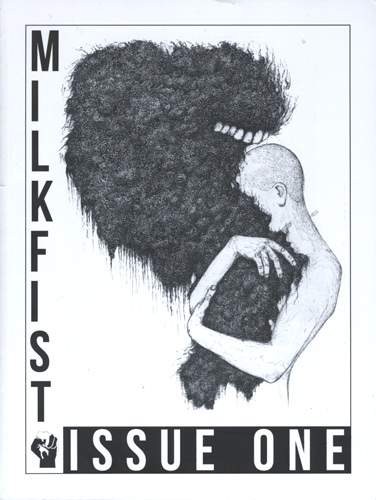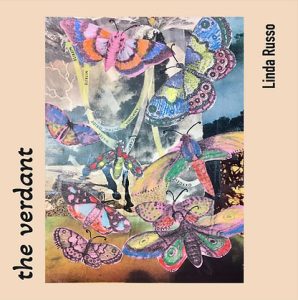Milkfist – Summer 2015
In a creative writing course, I was once asked to write the next scene of a story, then rewrite the scene as something entirely unexpected, and then write the scene in yet another direction. The exercise felt uncomfortable at times, pressing into strange or outrageous sequences. By contrast, the poems, stories, and essays in Milkfist take bizarre and wild turns with confidence and without apology. Self-described as “dedicated to showcasing the abscessed underbelly of art, nonfiction, poetry, and prose,” the magazine challenges readers with work that defies conventions of style, form, and storytelling. In a creative writing course, I was once asked to write the next scene of a story, then rewrite the scene as something entirely unexpected, and then write the scene in yet another direction. The exercise felt uncomfortable at times, pressing into strange or outrageous sequences. By contrast, the poems, stories, and essays in Milkfist take bizarre and wild turns with confidence and without apology. Self-described as “dedicated to showcasing the abscessed underbelly of art, nonfiction, poetry, and prose,” the magazine challenges readers with work that defies conventions of style, form, and storytelling.
“The Reckoning,” a poem by Laurin DeChae, is written in a stream-of-consciousness voice, much like I imagine Gertrude Stein’s poetry would read if she wrote in the twenty-first century. DeChae writes in a list with items visually separated by a tab and sectioned by paragraph breaks. Though there is no clear narrative, each item follows the next in ways that somehow make sense, though readers may not be able to articulate the connections. One such section is “swapping fame like spit circles statistically truer now than ever this is the requiem / of dark matter that which cannot be seen but felt spectral ascension gravity doesn’t make / for certainty or levity future lofty at best.” I recommend reading DeChae’s poem aloud several times, and slowly, to hear the full effect.
In flash fiction, creating an absurd character that readers are willing to follow is a tricky balance between dedication to absurdity and clarity of personality. Josh Fernandez successfully conducts this balancing act in his short story “Hole.” The story follows Charles, who is stuck in a hole. To give the reader a sense of Charles’s character, there are several instances near the beginning of the story where his thoughts are shared: “‘Even in the business end of a hole,’ Charles thought, ‘nothing is really that bad’” and “‘I’m like a newborn baby,’ Charles thought, trying to be positive.” Then, as the story progresses, so does the strangeness. Charles grows hungry in the hole and imagines a Sunday dinner so vividly he seems almost convinced he is eating. The story closes with a somewhat circular, absurd, conversation between Charles and a potential rescuer:
“I can rescue you,” the man said. ”But can you explain to me where you are?”
“I’m in a hole. I took a walk in the meadow and fell into this hole.”
“Yes, a hole,” the man said. He seemed to be deep in thought.
“The same hole you are standing at the top of, I am in the bottom of,” Charles said.
“I see,” the man said.
Emma Rose Smith moves the reader from location to location throughout her creative nonfiction piece “Marrickville 2204.” The piece is divided into twelve titled sections, which often could stand alone as flash nonfiction pieces about different settings within the ex-warehouse district of Sydney, Australia: a bar, an Asian grocery store, a club, a backyard. The strangeness and darkness of the piece stems from the setting itself and the strength of Smith’s depictions of the setting. For example, in the final section “The Grocery Store on Illawarra Rd, a Few Doors Down from the Pork Roll Shop, Is Closing Down,” Smith clearly describes the economic devastation of the district by focusing on one particular shop:
All the goods are piled up on the concrete floor. Ginger chew lollies front n’ cenna. Kilo jars of olives, of pickled eggplant, of pickled cabbage. Flimsy plastic sandwich bags filled with star anise and cloves and allspice and cumin.
“It’s the rent,” says the woman crouched on a crate near the door, tapping numbers into a crusty cash register, which is also on a crate. “We can’t afford it anymore.”
Milkfist has succeeded in presenting the underbelly of writing in its inaugural issue. Future readers should prepare for the weird, the unexpected, and the ever-expanding possibilities in creative writing.
[www.milkfist.com]





